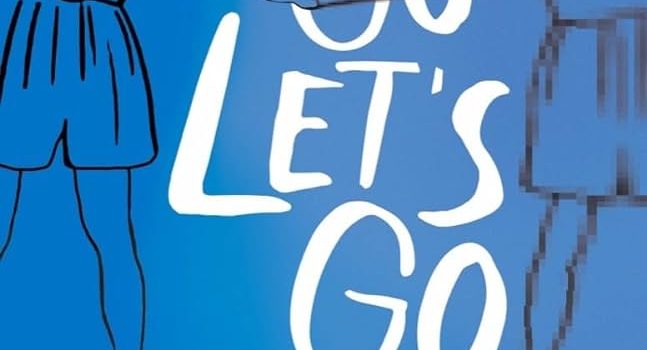Caren Gussoff Sumption Reviews Let’s Go Let’s Go Let’s Go by Cleo Qian
 Let’s Go Let’s Go Let’s Go, Cleo Qian (Tin House 978-1-95353-492-7, $18.00, 256 pp, tp), August 2023.
Let’s Go Let’s Go Let’s Go, Cleo Qian (Tin House 978-1-95353-492-7, $18.00, 256 pp, tp), August 2023.
Everyone – and everything – in Cleo Qian’s debut short story collection, Let’s Go Let’s Go Let’s Go – feels deliberately, surpisingly out of focus, at least, to me. Edges are indistinct, images muddy and untrustworthy. It’s dizzying, disorienting, and, at times, heart-stoppingly effective.
The collection itself is difficult to describe. Neither slipstream nor magical realism, it’s literary and lowbrow, masterfully written even as it simultaneously, in my opinion, feels unfinished. The stories are not particularly speculative, even the ones with obvious fantastical or supernatural elements; the language is sophisticated and stylish as it involves the most banal of pop culture; and the stories themselves are presented as complete thoughts, when they most certainly are not. Even the characters are impossible to pin down: They are all women, all coded in subtle ways as queer, and all Asian or Asian American in heritage, and while their gender, queerness, and background are important elements these are fully relatable people who, beyond specific identity, are simultaneously desperate to be seen and to disappear without a trace.
Of the 11 stories included in the collection, only four contain overtly speculative elements, and the standouts amongst these are “The Girl with The Double Eyelids” and “Power and Control”. In the former, a young student in China, Xiao Yun, undergoes double-eyelid surgery to “Westernize” her eyes. The surgery is successful, but, along with her new lid shape, she also gains visions of ever-morphing tattoos which appear on the people around her. These tattoos are abstract, symbolic, and literally give Xiao Yun second sight into the dark secrets of her friends and family, especially the dark machinations of a family friend who is a pedophile. However, Xiao Yun never quite gets the hang of interpreting these visions, and only understands their significance, for the most part, later on.
In the latter story, a dental hygienist, Greta, is an alchemical hobbyist who uses her skills to create charms that impose dominance over her beautiful, shy girlfriend. In this reality, though, alchemical tricks only last a short period of time, and so, Keychain, Greta’s girlfriend, can be under her magical control only for a while. It is then that Greta must, instead, rely on the more reliable threat of nonmagical verbal and physical violence to exert the titular power and control.
Both stories, while wildly different from one another, both focus on how difficult it is to understand – to really know – oneself or others. Neither Xiao Yun nor Greta are able to critically or objectively view and interpret their own thoughts and actions, or anyone else’s. They never quite get the full idea of consequence, or, really, cause and effect, which I found both frustrating and charming: a kind of naked reality verisimilitude that’s satisfying in its portrayal, but not particularly uplifting.
This, in fact, seems to be the very thing that holds Qian’s collection together as a whole. The stories, speculative or not, just stop, as opposed to resolve. In almost every case, there’s no grand realization – or, if there is, no grand change that comes from that realization. Qian’s women move through a world threaded with malaise and vague menace, disappointed and angry. In many stories, we learn about the cultural perfectionism in which they were raised, the generational trauma they carry, and, for the characters who are Asian American, the deep sense of being of two cultures, but belonging to neither. Rootless, aimless, they embody that period between young adulthood and adulthood, where the universal anxiety of what one wants/what one’s expectations are smack up against the individual experience of being an immigrant, being from a specific culture, being female – all the aspects that give that transition anxiety its flavor. Qian rarely sees the characters through to a conclusion, and in that, all the stories, SF/F or not, take on a lightly apocalyptic feel.
The title story does a great job of embodying this uncomfortable, uncanny feeling. In “Let’s Go Let’s Go Let’s Go”, a group of four high school friends have a reunion attending a bizarre art retreat on Japan’s Mount Haruna. Charismatic Lily is the glue that holds the other three together – the narrator Emi, quiet Goto, and unpleasant Reiya – but Lily herself is unpredictable and unreliable. The isolated retreat property belongs to the founder of a collective called the “Anti-Civilization Committee,” which espouses a philosophy of impermanence that is partly Buddhist, partly nihilistic. As the four spend time in the house, ever watched by live-streaming cameras, they all unravel and pull away from one another, ending with Lily herself disappearing mysteriously. We can’t be sure whether Lily has run away or was taken. We never learn why she’s gone. We never learn if she’s found. We are left only to wonder, along with the other characters, what to do and where it leaves us – feelings that are distressing, disheartening, but ultimately, true.
Caren Gussoff Sumption is a writer, editor, Tarot reader, and reseller living outside Seattle, WA with her husband, the artist and data scientist, Chris Sumption, and their ridiculously spoiled cat-children.
Born in New York, she attended the University of Colorado, the School of the Art Institute of Chicago, Clarion West (as the Carl Brandon Society’s Octavia Butler scholar) and the Launchpad Astronomy Workshop. Caren is also a Hedgebrook alum (2010, 2016). She started writing fiction and teaching professionally in 2000, with the publication of her first novel, Homecoming.
Caren is a big, fat feminist killjoy of Jewish and Romany heritages. She loves serial commas, quadruple espressos, knitting, the new golden age of television, and over-analyzing things. Her turn offs include ear infections, black mold, and raisins in oatmeal cookies.
This review and more like it in the October 2023 issue of Locus.
 While you are here, please take a moment to support Locus with a one-time or recurring donation. We rely on reader donations to keep the magazine and site going, and would like to keep the site paywall free, but WE NEED YOUR FINANCIAL SUPPORT to continue quality coverage of the science fiction and fantasy field.
While you are here, please take a moment to support Locus with a one-time or recurring donation. We rely on reader donations to keep the magazine and site going, and would like to keep the site paywall free, but WE NEED YOUR FINANCIAL SUPPORT to continue quality coverage of the science fiction and fantasy field.
©Locus Magazine. Copyrighted material may not be republished without permission of LSFF.








